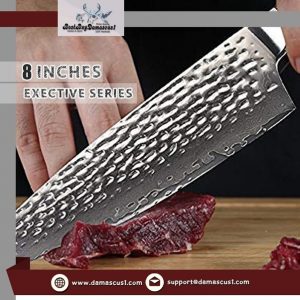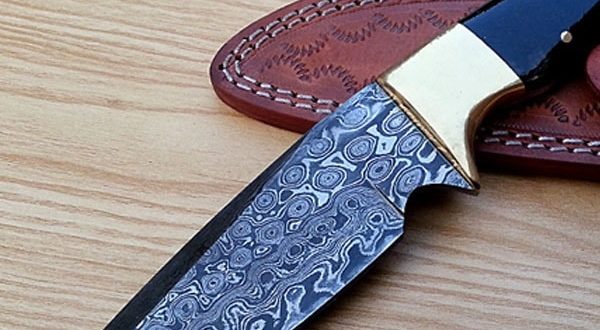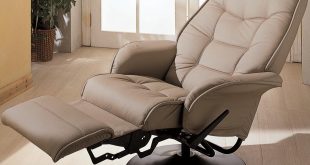Damascus steel Knives
In December 2014, we tested the Damascus steel knives from several manufacturers again. We first tested the sharpness of the blade and its maintenance, the resistance of the Damascus steel and how the blade reacts according to the sharpeners used and finally, the simplicity of its use. You will also find a complete comparison between Damascus steel knives and “classic” steel knives.
Knives tested
For this test, we used the Damascus steel knives manufactured by Damascus1, which are today the largest Damascus steel blade manufacturers. In order to have the most accurate results, we tested other Damascus steel knives from several other manufacturers. To compare these Damascus steel knives, we used Chef’s knives from Damascus1.com
The cutting edge when buying
When we received the Damascus Steel knife, we found the blade very sharp and perfectly sharp. That is to say as sharp as the steel knives or in some cases better! However, when testing with cheaper Damascus Steel knives, the edge has nothing to do with that of and is not up to the cutting edge of steel knives.
Use of Damascus steel knives
After testing the cutting edge out of the factory, six people cut carrots and onions in order to have the most objective opinion on cutting Damascus steel knives.
The general opinion is that the knives cut the wooden board used and that unlike the steel knives, they slip less well on the chosen support. Cutting with Damascus Steel knives is therefore less fluid than cutting with steel blades. We tested two knives (13cm and 18cm) and found a difference in use between the two. Not because of the size of the blade but due to its fineness and geometry.

Chipping
Damascus1 adds a notice to their knives stating that, unlike steel knives, Damascus Steel knives are not made to be twisted because the blade can break. The knife should be used in a “straight” cut. When we used the knife following Damascus1’s advice, we found that the blade left deposits on the food after just one afternoon of use. We ask ourselves the question: “What will be the quality of the blade in 5 years and where are the deposits left by the knife?”
Damascus1 knife after use
The cutting edge after use
After use, the cutting edge of all the knives has been tested. To our surprise, the Damascus Steel blades had better kept their sharp razor than the steel blades. The manufacturer Kyocera is keeping its promise by saying that Damascus Steel knives will stay sharp longer than conventional knives. Due to their specific shape and thinner blade than steel knives, Damascus steel knives require less maintenance on blade sharpening.

Sharpening Damascus steel knives
The next step was sharpening the blades. For steel blades, we use Naniwa water stones. For Damascus steel blades, due to the hardness of the blade, we used diamond stones. First observation: it is difficult to obtain a satisfactory result with the Damascus steel blades. The home maintenance of these knives is therefore compromised.
However, Damascus steel knives can be returned to the supplier for sharpening. A voucher is provided for the purchase of the knife. The problem is that you have to pay the transport costs yourself to the factory and you are deprived of your knife for several times. The maintenance of these knives with a simple stone or a fast sharpening is impossible whereas with the steel knives, it is very simple to sharpen oneself their blade and you have a wide choice of tools!
The torsion test of Damascus steel
On the packaging of the Damascus steel knife, it is specified that the knives cannot undergo too strong twisting of the blade to the risk that it will break. So we tested and measured the pressure that blades could endure.
To do this test, we used a U-shaped device that measures the pressure experienced by the blade. The 18 cm Damascus Steel knife breaks after a pressure of 0.33Nm which is better than the other tested steel knives which break at a pressure of 0.30 Nm. The Damascus1 13 cm has a worse result since only pressurized to 0.08 Nm while the VG-10 steel knives (the same size but with a thinner blade) break at 0.65 Nm pressure or 7.75 times higher pressure ! The big winner of this test is the Whüstof Classic Knife which has a pressure of 1.34Nm. Regarding the first prices of Damascus Steel knives, they did not pass the test because after a simple twist of the blade, the blades broke.
Conclusion
- When you buy a Damascus Steel knife made by a good supplier, the knife is delivered perfectly sharpened. Their edge will stay longer than the steel knives and they will not rust! In addition, many people appreciate the lightness of the knife.
- However, it is not possible or very difficult to sharpen a Damascus Steel knife yourself. Even if the knife does not need as much maintenance as the steel knife, sharpening their blade is a long process that will deprive you of your knife for several times. We specify that we do not recommend the use of a diamond stone for these knives due to non-effectiveness. The only real option is to return the knife to the supplier.
- We also ask about the particles left by the blade, on food. Even if the deposits are tiny, it says a lot about the quality of the material.
- That’s why we decided not to sell Damascus Steel knives on our site. We believe that it is important to sell products in which we have complete confidence.
 Universal Bloggers
Universal Bloggers






